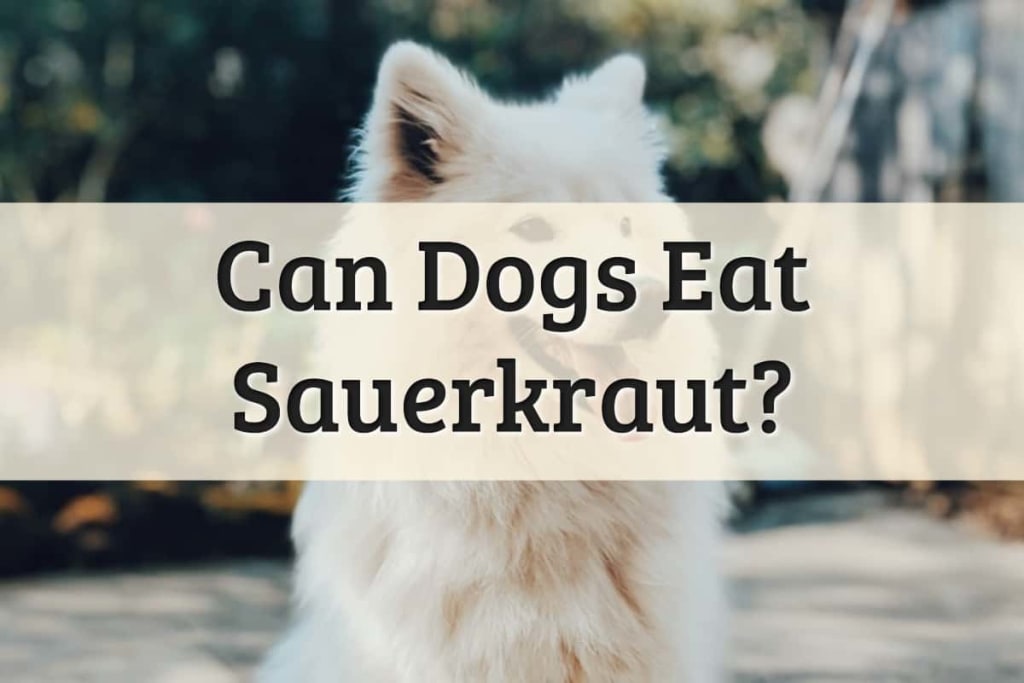Can Dogs Eat Sauerkraut? Is it safe for Dogs?
Exploring the Safety and Benefits of Dogs Eating Sauerkraut

Many pet owners are curious about whether it's safe to share sauerkraut with their furry friends. After all, dogs often show an interest in what we're eating, and sauerkraut, with its tangy and fermented goodness, may seem like a tempting treat for them. So, let's delve into the topic and explore whether dogs can safely enjoy sauerkraut.
Safe for Dogs
The good news is that sauerkraut, when consumed in moderation and prepared properly, can be safe for dogs. This popular fermented cabbage dish contains various health benefits and nutritional components that can be advantageous for our canine companions.
However, it's essential to note that not all dogs have the same tolerance for certain foods, and individual sensitivities can vary. Therefore, before introducing sauerkraut into your dog's diet, it's crucial to consider their specific needs and consult with a veterinarian if you have any concerns.
Nutritional Benefits of Sauerkraut
Sauerkraut is not only delicious but also packed with several essential nutrients. It is a low-calorie food that contains fiber, vitamins C and K, as well as minerals like potassium and iron. When you feed your dog sauerkraut, they can potentially benefit from these nutrients, promoting overall health and well-being.
Additionally, sauerkraut is rich in antioxidants, which help protect cells from damage caused by harmful molecules called free radicals. These antioxidants can support your dog's immune system and contribute to their long-term health.
Health Benefits of Sauerkraut for Dogs
Beyond the basic nutritional value, sauerkraut offers several specific health benefits for dogs. One notable advantage is its probiotic properties. Probiotics are beneficial bacteria that promote a healthy gut flora balance. Sauerkraut is a natural source of live and active lactobacilli, which are beneficial bacteria responsible for the fermentation process.
By introducing sauerkraut into your dog's diet, you can potentially support their digestive health and improve nutrient absorption. A healthy gut microbiome can also enhance your dog's immune system and reduce the risk of certain gastrointestinal issues.
Sauerkraut as a Probiotic
Sauerkraut contains Probiotic. Probiotics play a crucial role in maintaining the balance of good bacteria in the gut, which is essential for proper digestion and overall health. The live lactobacilli found in sauerkraut can populate your dog's digestive tract with beneficial bacteria, promoting healthy gut flora.
This can be particularly beneficial for dogs with sensitive stomachs or those who have recently undergone antibiotic treatment, which can disrupt the natural balance of gut bacteria.
However, it's important to remember that sauerkraut should not be the sole source of probiotics for your dog. Consult your veterinarian to determine the best approach to incorporating probiotics into your dog's diet.
Different Types of Sauerkraut
When considering feeding sauerkraut to your dog, it's crucial to choose the right type. Homemade sauerkraut prepared with natural fermentation techniques, such as using salt and water, is generally a safer option. Commercially available sauerkraut, particularly the refrigerated variety found in health food stores, is also a viable choice.
However, be cautious with store-bought sauerkraut that contains additional seasonings or additives, such as garlic or onion, as these can be harmful to dogs. Furthermore, sauerkraut that has been pasteurized loses its beneficial live bacteria, reducing its probiotic potential.
Feeding Sauerkraut to Your Dog
Before serving sauerkraut to your dog to eat, it's essential to prepare it properly. Start by rinsing the sauerkraut with cold water to remove excess salt and potential seasonings. This step helps make the sauerkraut safer for your dog's consumption.
It's also crucial to introduce sauerkraut gradually into your dog's diet to assess their individual tolerance. Begin with small portions, such as one tablespoon, and monitor your dog for any adverse reactions. If your dog shows no signs of discomfort or digestive issues, you can gradually increase the amount over time.
However, it's crucial to remember that sauerkraut should only complement a well-balanced dog food diet and not replace it entirely.
Risks and Considerations: Is it toxic to dogs?
While generally, dogs can eat sauerkraut, there are certain risks and considerations to keep in mind. First and foremost, it's essential to avoid feeding dogs sauerkraut that contains onions or garlic. These ingredients are toxic to dogs and can cause various health issues, including anemia.
Additionally, some dogs may have sensitivities or allergies to raw cabbage or fermented foods, which can result in digestive discomfort or allergic reactions. If you notice any adverse effects after introducing sauerkraut into your dog's diet, discontinue its use and consult with your veterinarian.
Can sauerkraut be bad for dogs?
Although sauerkraut can have many benefits for dogs, excessive consumption can potentially lead to adverse effects. Dogs that consume a large amount of sauerkraut may experience digestive upset, including bloating, gas, or diarrhea. It's crucial to introduce sauerkraut in moderation and monitor your dog's response.
If you have any concerns or your dog experiences persistent digestive issues, consult with your veterinarian for guidance.
Can Dogs eat canned sauerkraut?
When it comes to canned sauerkraut, caution is advised. While some canned sauerkraut may be safe for dogs, it's important to read the label and check for any harmful ingredients or excessive salt content. Canned sauerkraut often undergoes additional processing and may contain additives that can be harmful to dogs.
Whenever possible, opt for homemade or refrigerated sauerkraut to ensure the highest quality and minimize potential risks.
How much can dogs eat sauerkraut safely?
Determining the appropriate amount of sauerkraut for your dog depends on their size, overall health, and individual tolerance.
As a general guideline, it's recommended to start with small servings, such as one tablespoon, and gradually increase the amount over time to a cup of sauerkraut if your dog tolerates it well.
Remember that sauerkraut should only be a supplement to your dog's regular diet and not the primary source of nutrition. If you have any concerns or questions regarding portion sizes, consult with your veterinarian for personalized guidance.
Sauerkraut Preparation
To ensure the safest sauerkraut experience for your dog, take the time to properly prepare it.
Rinsing the sauerkraut with cold water helps remove excess salt and any potential seasonings or additives. This step is essential to make the sauerkraut more suitable for your dog's consumption.
Additionally, avoid giving your dog sauerkraut that has been cooked with onions, garlic, or excessive spices, as these can be harmful. By adhering to these precautions, you can make sauerkraut a safer and healthier addition to your dog's diet.
Other Factors to Consider
When deciding whether sauerkraut is appropriate for your dog, there are a few other factors to consider.
Firstly, some dogs may simply not enjoy the taste of sauerkraut or have aversions to certain textures. If your dog doesn't show interest or refuses to eat sauerkraut, forcing them to consume it is not recommended.
Additionally, older dogs or those with specific health conditions may have different dietary requirements. It's crucial to consult with your veterinarian to ensure sauerkraut aligns with your dog's specific needs and health status.
Final thoughts on this dog food
In conclusion, sauerkraut can be safe for dogs when introduced properly and in moderation. It offers several nutritional benefits, including essential vitamins, minerals, and antioxidants.
Moreover, sauerkraut acts as a natural probiotic, promoting a healthy gut flora balance in dogs.
However, it's crucial to consider individual sensitivities, avoid harmful ingredients like onions and garlic, and monitor your dog's response to sauerkraut. By following these guidelines and consulting with your veterinarian, you can make an informed decision about incorporating sauerkraut into your dog's diet.
Remember, sauerkraut should always be a complementary addition to a balanced dog food diet, supporting your furry friend's overall health and well-being.
About the Creator
Typical Dude
Just your average guy navigating life's twists and turns. AI Enthusiast, good vibes, and terrible jokes. Stumbling through this adventure called existence. 🌍✌️






Comments
There are no comments for this story
Be the first to respond and start the conversation.